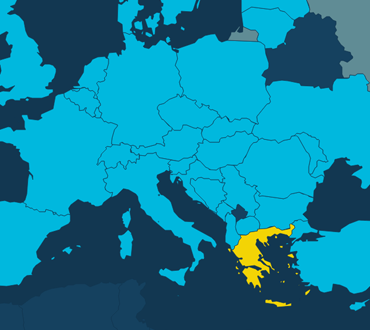 Greece
Greece

ENTRY INTO FORCE of the European Convention on Human Rights
28 November 1974
Number of implemented cases*
1047
Examples
Hate crime laws strengthened after police failed to properly investigate a racist attack
Rafi Sakir, a victim of a racist attack, was held in a dirty, overcrowded prison cell because he did not have residence papers to legally stay in Greece. Police did not even ask him to make a statement about the attack. The European court ruled that they had failed to properly investigate his case. This judgment led Greece to treat hate crimes more seriously.
Same-sex couples win the right to enter civil partnerships
As a same-sex couple, Grigoris Vallianatos and Nikolaos Mylonas were prevented under Greek law from entering a civil partnership, which is a form of official union different to marriage. The European Court of Human Rights ruled that this was discriminatory. In response to the judgment, Greece passed a new law that gave same-sex couples the right to enter civil partnerships.
Justice and reforms after airmen were given criminal convictions for their religious activities
Three Greek air force officers were members of the Pentecostal Church. They were all convicted for promoting their religion and given suspended prison sentences of over a year. The European court ruled that convicting the men for these conversations with civilians had violated their right to religious freedom. The Greek government took steps to ensure that no such prosecutions happened again.
Mass shooting of strawberry pickers leads to ongoing reforms
Hundreds of migrants were forced to work for months unpaid. When they demanded their pay, armed guards shot at them, seriously injuring 30 people. The guards and the employers were merely fined. The European Court of Human Rights ruled that the authorities had failed to properly address forced labour and human trafficking in this case – leading to widespread ongoing reforms.
Practical reforms to combat human trafficking
L.E. was tricked into travelling to Greece with a human trafficker. When they arrived, the trafficker took L.E.’s passport and made her work as a prostitute. The European court found that after the authorities had been alerted, their response suffered from shortcomings and delays. Since that time, reforms have been introduced to help tackle human trafficking in Greece.
Reforms made after unreasonable punishment given to conscientious objector
Iakovos Thlimmenos was a Jehovah’s Witness. He refused to do military service on religious grounds and was sentenced to four years’ imprisonment. Upon his release, he was also prevented from working as an accountant. The European court ruled that this had been unreasonable and unjustified - amounting to discrimination based on religion. Laws were changed as a result.
Changes to fair compensation laws after families were forced to give up their land
Two families owned some land in Thessaloniki. The authorities took away part of the land to carry out public works - but the families were paid only a fraction of the land’s true value. The Strasbourg court found that this violated their right to property. Greek case-law was subsequently changed, requiring courts to properly compensate people when their property is expropriated.
* This figure includes all judgments and decisions from the European Court of Human Rights (including friendly settlements) concerning which the Council of Europe’s Committee of Ministers has decided that all necessary follow-up measures have been taken. Source: the database of the Department for the Execution of Judgments of the ECHR, HUDOC-EXEC.


